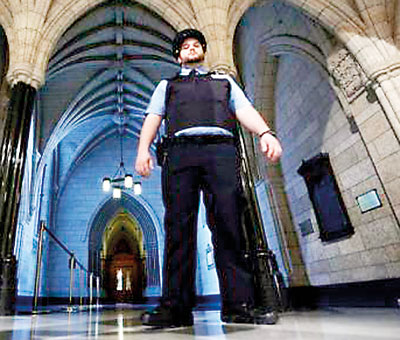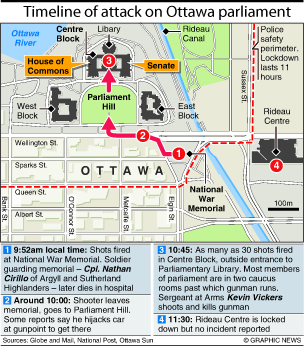Sunday Times 2
Canada vows tougher laws as citizens worry in face of attacks
View(s):OTTAWA/HAMILTON Ontario (Reuters) – Canada vowed to toughen laws against terrorism in ways that critics say may curtail civil liberties as a country that prides itself on its openness mourned the second soldier this week killed by homegrown radicals.

A security guard patrols the hallway near the entrance to the Parliamentary Library where a gunman, who killed a soldier and ran through Parliament shooting, was shot dead (Reuters)
Prime Minister Stephen Harper joined a crowd at the National War Memorial in Ottawa to mark the death of Corporal Nathan Cirillo, who was shot by a troubled and drug-addicted convert to Islam on Wednesday while on ceremonial guard at the memorial in the centre of the country’s capital.
Behind the sombre scenes, Harper and his Conservative colleagues scrambled to beef up anti-terrorism legislation that was already in the works before the attacks. An opinion poll showed a majority of Canadians lacked confidence in their security services’ ability to deter homegrown threats.
Investigators said there was no apparent link between the two attackers – one killed a soldier in Quebec and the other killed Cirillo in Ottawa, before they themselves were shot dead – but Canadians worried about the parallels between them.
Police said both were Canadian citizens who had been radicalised, a term the government uses to refer to Canadians who become supporters of militant groups such as Islamic State.
Justice Minister Peter MacKay said the government would act swiftly to  toughen security laws and would go beyond the terms of a bill to strengthen the powers of the Canadian Security Intelligence Service spy agency that was already being drafted before this week’s incidents.
toughen security laws and would go beyond the terms of a bill to strengthen the powers of the Canadian Security Intelligence Service spy agency that was already being drafted before this week’s incidents.
“We’re looking … to see if there is a way in fact to improve or build on those elements of the Criminal Code that allow for pre-emptive action, specifically in the area of terrorism,” MacKay told reporters in Brampton, Ontario.
A government source said legislation to be introduced next week on the spy agency would be largely unchanged from the bill that was being prepared before Wednesday’s Ottawa attack. The government will put forward more measures later, the source said, and they will include wider powers to address security threats in the wake of the attacks.
Fears of a backlash against Muslims also grew as a mosque in Cold Lake, Alberta, was vandalised. Windows were smashed and someone wrote “go home” and “Canada” on the building in red paint. The town is home to the military base from which Canada sent six fighter jets to take part in air strikes against Islamic State militants.
“This shows how fragile the situation can be if it is not properly managed,” Imam Syed Soharwardy, founder of Muslims Against Violence, said of the Cold Lake vandalism.
Soharwardy led a memorial service for the dead soldiers in a packed makeshift prayer hall in Calgary, where he urged the Muslim community to report any harassment to police.
“We cannot take abuse because of one or two people who committed these crimes. We condemn them more than anybody.”

